Hakobyan, Aram–Gong, Patrick
1–0
Slater-Jones, Henry–Tecleaf, Pavel
0–1
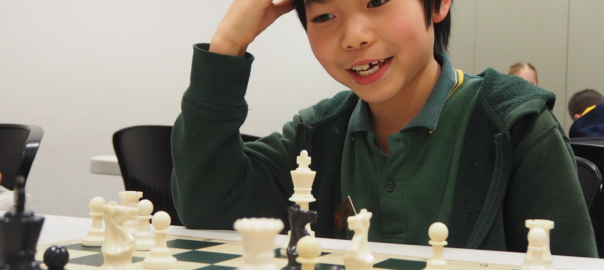
A lot of people think chess is for those that are able to sit still for hours. We hear it all the time: ‘My son could not sit down for a chess game that goes for over an hour! He would get bored and distracted.’ But that could not be further from the truth. It is sometimes exactly what they need to focus and concentrate. We see participation in chess increasing every school term, so we think the game is not too slow!
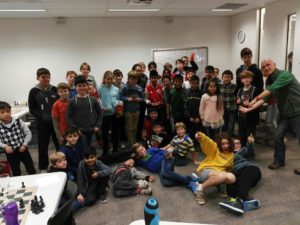
All people, especially kids, get restless and distracted from time to time. It’s normal for children of all ages to have lots of energy. Preschoolers, for instance, can be very active — they often move quickly from one activity to another. Older kids and teenangers are also energetic and don’t have the same attention span as adults.
But we are not talking here about children with ADHD (Attention Deficit Hyperactive Disorder), that is when the hyperactivity is unusually high and come to a point where it can interfere with their schooling, friendships and family life. Chess can also have great benefits for these students, but in this blog we are looking at the normal hyperactivity of children.
So back to normal, hyper, enthusiastic children: Yi Yang is one of Chesslife’s brightest students. He is always full of energy and engaging with everyone and everything around him. Nevertheless Yi Yang finds the ability to focus in front of the chess board and play long, complicated games with skill and accuracy.
Yi Yang not only plays at the chess club, but has also been participating in the Interschool Chess Championship, representing the community team run by the Campbelltown Council.
We chatted to him at the Campbelltown after-school chess club to see how chess had helped him develop in other areas of his life.
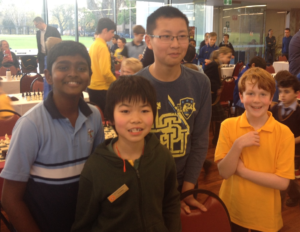
Chesslife: How long have you been playing chess?
Yi Yang: Two years. I started when I was in year two and I’m in year four now.
Do you play at school and at home?
I play at home, not at school. I play with online players on the weekend.
What do you like about chess?
There’s different pieces and different types of moves, and there are tournaments to get to verse different players. David can analyse my games and I learn something so I don’t make another mistake.
I like it at the chess club because they teach you new stuff and there’s a lot of tactics.
What’s your favourite piece and why?
The king because it’s the boss and once it gets checkmated the game’s over.
Have you been to any tournaments, and what have your results been like?
I always come fourth. Last year I started playing in tournaments: the July Junior, the Adelaide Hills Open, the October U11 State Championships. [This is not always true, we have been seeing YiYang getting better every tournament and even going home with some prizes!]
What would you say to young people thinking about learning chess?
Learn now, when you grow up you might become a very good chess player. There are lots of fun activities in chess.
How has chess helped you at school or with things like concentration?
Sometimes I look at other players’ boards and sometimes I just focus on mine. It has gotten easier to focus. When I first started I just kept looking at other people’s boards.
You don’t lose if you concentrate. Sometimes when I’m waiting for the person to move I just wait because I already know what I’m going to move. The concentration level will go up by focusing. You don’t talk much during chess and then at school when the teacher’s talking, you don’t talk because at chess you’ve learnt.
There are lots of other examples where students are loving the game and loving the challenge of focusing for long periods of time. Even noticing themselves that they are becoming better at this over time is fantastic.
So is chess too slow? We don’t think so!
Have you got a story to tell on how chess has helped you? Let us know and you could be featured in our next blog!
It has been an incredible event, well organised with extremely helpful volunteers who were ready to assist us where ever we needed.
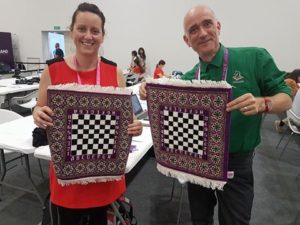
And the level of chess played was amazing! Not only by the Superstars like Magnus Carlsen, Wesley So and many many others, but also by the juniors.
Over the last 14 days we have been giving you an insight into the young minds of players from around the world. Some with very high goals for the futures and others that were enjoying the opportunity to represent their country.
At a tournament there are always opportunities to win, to score high and to go home with a trophy or title. And the juniors that we featured have certainly exceeded expectations!
So for our final wrap up – How did they go? If you want to read their interview, just click on their image!
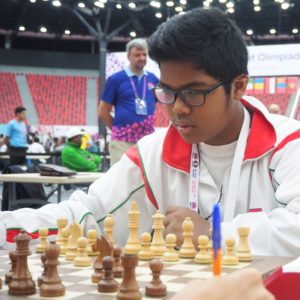
CM Haridify Ralison from Madagascar hoped to get his FM title this tournament and it came to the very last round! But he succeeded; with 6.5/10 he obtained his FIDE Master title!
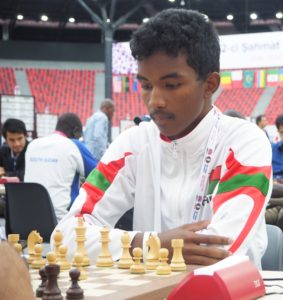
Unfortunately 5/9 was not enough for FM Fy Rakotomaharo to get his IM norm this tournament. But playing on board 1 for your country certainly adds the extra pressure! He is off to the World Youth in Khanty-Mansiysk next week and we hope to see him there achieve his goals!
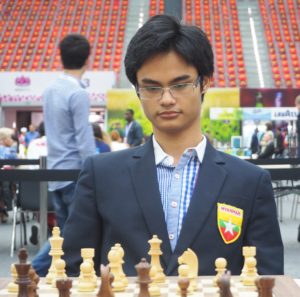
With two rounds to spare Maung Maung from Myanmar obtained his FIDE Master title with a score of 6/9! Congratulations Maung Maung, we look forward to follow your journey in chess!
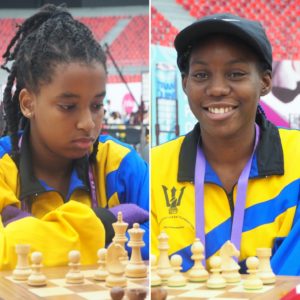
Competition was strong for Gabriela and Segan from Barbados, but these cheerful girls enjoyed their first Olympiad and we are sure we will see them again on the world stage!
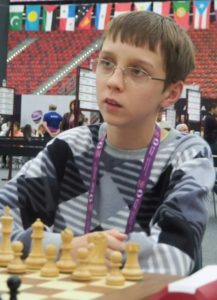
Our very own Australian Superstar obtained his double GM norm with a round to spare! With a total score of 8.5/10 he remains undefeated at the two Olympiad’s he has played. Anton also came fifth in the list of top board 4 players. Anton is without doubt going to be featured in the Australian Open team for many more years to come!
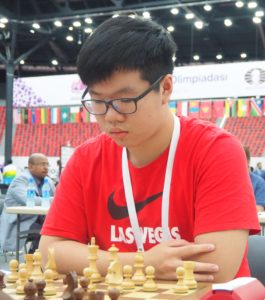
Ieong Seak Hin from Macau played like a legend and with a final score of 4.5/9 he can be extremely proud of his efforts!
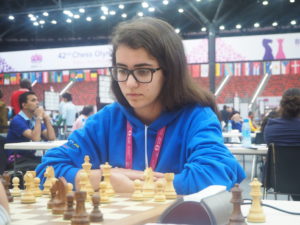
18 year old Kathie from Brazil got her Candidate Master title with a final score of 4.5/8! Great effort as she has faced some very strong opponents!
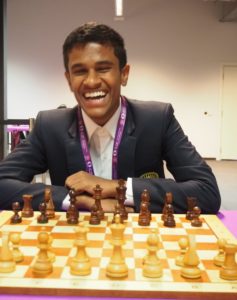
17 year old Grandmaster Murali from India scored 2/2 at this Olympiad, contributing wonderfully to his team, allowing them top win Gold in Category A! [Teams are divided into 5 categories based on their combined rating, India was in the top category]
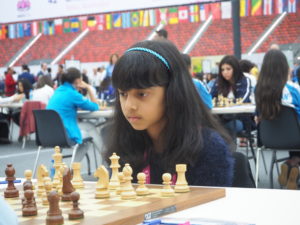
10 year old Nadia Braganza from New Zealand ended her Olympiad journey with 4/9, which for such a young player is an incredible feat! Certainly something she can be extremely proud of! We hope to see Nadia play in Australia soon and give our aussies a run for their money!
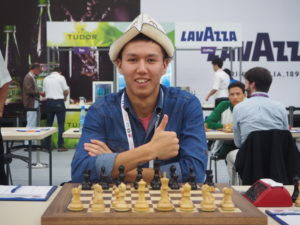
It was a delight to catch up regularly during the Olympiad with Tagir from Kyrgyzstan. Having played a GM, two IM’s and a CM he had some strong competition this Olympiad and a final score of 3/7 is nothing to be ashamed of! Well done Tagir!
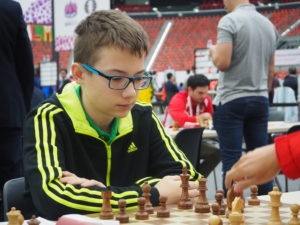
Michaelides from Cyprus, may not have had the tournament he had hoped for, but playing against two GM’s, and IM and three FM’s is always a great opportunity for learning! We are certain Michaelides will have a very bright future in chess and will most certainly feature on the world stage more often!
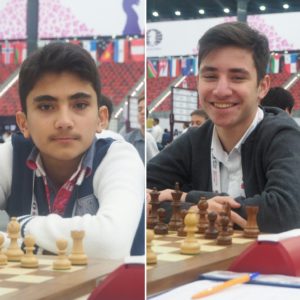
And finally we finish with the boys from Azerbaijan. Nail finished with 5.5/9 and Abdulla 6/10. Abdulla also now has a running rating of 2317, which is enough to grant him his IM title! But most incredibly, the entire Azerbaijan team finished first in their rating category, securing Gold and an incredible opportunity to stand on the podium at the Closing ceremony!
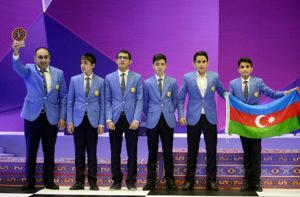
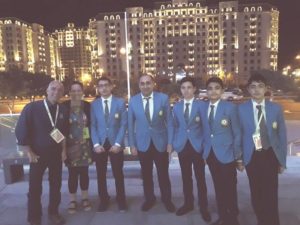
We hope you have enjoyed our blogs and we are looking forward to continuing our stories as we travel to tournaments, both within South Australia, Nationally and Internationally!
Keep up the good work everyone! We love seeing you all play chess!
David and Sabrina Koetsier
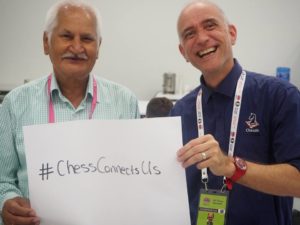
As organiser of the Olympiad, Azerbaijan was granted 3 teams in the Open division and 3 teams in the Women’s division. And instead of putting three adult teams in the mix, they are showing what a fantastic supportive chess nation they are by providing the opportunity to their juniors to play. Both their women’s and open third teams are comprised of young players!
So it was only logical that we have been trying to get an interview with the ‘Small Tigers’, the 3rd Azerbaijani Open team that consists of 15 year old Vugar Asadli with a rating of 2406, 16 year old Nail Bashirli with a rating of 2387, 14 year old Abdulla Gadimbayli with a rating of 2294, 13 year old Muradli Mahammad with a rating of 2331 and 16 year old Parviz Gasimov with a rating of 2323. They are a true inspiration to junior chess to be representing their country at this Olympiad.
Today, after speaking to their captain GM Azer Mirzoev, we were given the go-ahead and with the assistance from the volunteer Azerbaijani translators that are available, we sat down with 16 year old Nail and 14 year old Abdulla.
Nail is the 2nd ranked player U16 in Azerbaijan and Abdulla is the 2nd ranked player U14. Both have played in the U16 Olympiad this year in Slovakia, but did not cross paths with the Australians behind the boards.
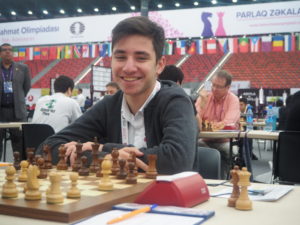
Chesslife: How old were you when you started playing chess?
Nail: I started when I was 10 years old and was taught by my aunty.
Abdulla: I started at the age of 5 and was taught by my father and brother, over time I have continued using a chess coach and going regurlarly to the chess club.
Chesslife: How much chess do you study per day?
Nail: I practise chess every day around 4-5 hours
Abdulla: I study chess every day around 5-6 hours
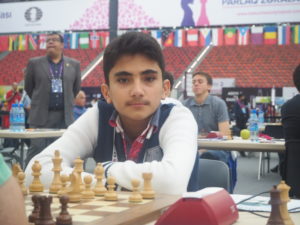
Chesslife: What kind of material do you use to study?
Nail: Aagard’s books or Dvoretsky’s end game book
Abdulla: …and material of course that our teacher gives us.
Chesslife: What is your favourite book?
Nail: I don’t know what my favourite book is, but my first book was Karpovs Best games
Abdulla: Easy! 100 games by Bobby Fischer
Chesslife: How old were you when you obtained your first norm and where are you at with obtaining your IM norm?
Nail: I have obtained all 3 norms for my IM so I will be an International Master soon. I obtained my FIDE Master title in February 2015 in Prague.
Abdulla: I have obtained my 3 norms for IM, but my rating is just a little too low. Hopefully this tournament will bring it up and allow me to obtain my International Master title. I got my FIDE Master title in 2010 at the World Youth Chess Championships in 2010 when I played in the U8 category.
Chesslife: Is this your first Olympiad and what was your first International Tournament?
Nail: This is my first open Olympiad, but I have just finished in the U16 Olympiad in Slovakia. My first international tournament was in 2010 in Bulgaria.
Abdullla: This is also my first Open Olympiad and played overseas for the first time at the World Youth Chess Championships in 2008 in Vietnam.
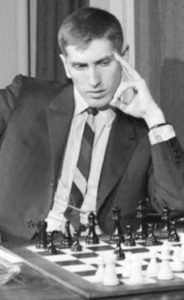
Chesslife: Who is your favourite chess player?
Abdulla immediately pipes up – that is easy! Bobby Fischer! I love his playing style.
Nail: My favourite chess player is Lasker. His amazing tactical work is to be admired
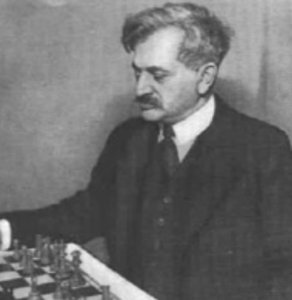
Chesslife: How would you describe the junior chess league in Azerbaijan?
Nail: Very good, there are rapid tournaments every week. There are around 6-7 chess schools in Baku.
Abdulla: It is also getting bigger and many good players are coming along.
Chesslife: We have been told your team is called ‘The Small Tigers’ Who came up with that?
Nail: That was our team captain!
Abdulla: And the 3rd Azerbaijani girls teams is called the angels!
Chesslife: What is your most memorable game?
Nail: I like the one I played in round 9 against Daniel Colindras from Honduras.
Abdulla: When I won with Black in 21 moves in Vietnam against Nguyen Anh Khoi.
Chesslife: What has chess taught you?
Nail: To be patient and not to go too fast.
Abdulla: Yes all of that and that it has increased my concentration.
Chesslife: What are your goals for the future?
Nail: To become a Grandmaster in the next 1-2 years. I will need to be playing in every possible Open I can find.
Abdulla: Yes I would like that too, but will need to work on my rating first and maybe try and find a new coach and work very hard.
Chesslife: What is your advice to Australian Junior Chess players?
Nail: In order to be succcesful in chess you need to work very hard and every day.
Abdulla: Agreed! And work on material with weight to ensure you improve.
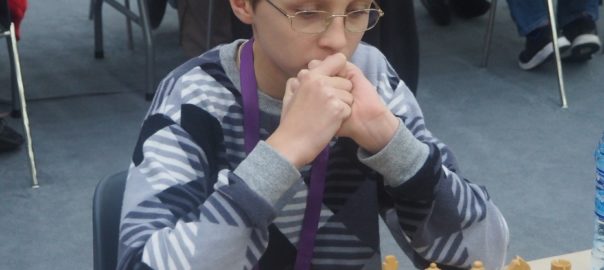
Our blog about juniors at the Olympiad would just not be complete without our very own Australian Superstar 15 year old Anton Smirnov! After round 10 he is still undefeated and has obtained 2 GM norms. With a rating of 2482 he is currently the top U16 player in Australia and also the 3rd ranked U16 player across Asia! He is also currently the 8th U16 player in the world! (source FIDE website).
Once he completed his analysis with his oponent Bogdan Bocinovic from Croatia and playing for the International Chess Committee for the Deaf (ICCD) he took the time to sit down with us so we could ask him some questions.
Chesslife: For those that may not be aware – How old are you?
Anton: I am 15 years old.
Chesslife: What age did you start playing chess?
Anton: My father started teaching me when I was 4 years old, but that did not work. I just wanted to move the pieces and did not understand the rules. When I was four and a half he tried again, but this time using the Chessbase program ‘Fritz and Chesster’. This programs uses fairytales and stories to teach very young people the rules of chess.
Chesslife: How many hours per day or per week do you study?
Anton: I don’t know. I study every day, but don’t keep track of how much time I spend. I meet with my coach via Skype twice a week for 2 hours.
Chesslife: What was your first chess book?
Anton: I used to have a small tactics manual wiith around 1000 problems that I enjoyed very much.
Chesslife: How old were you when you obtained your first title?
Anton: When I was 12 years old in 2013 I obtained my FM title. This was at a zonal in Fiji and in fact my live rating reached the required level at the same time as I reached my norm. It all came together at the same time.
Chesslife: What was your first international tournament?
Anton: That was the World Youth Chess Championship in 2007 in Turkey. I played in the U8 category.
In this tournament Anton did not have a FIDE rating yet and played among 16 (!) other Australian comrades, among which are Emma Guo (U12 girls) and Alexandra Jule (U18 girls), who are currently playing in the Womens Olympiad team.
Chesslife: How have you socially or mentally benefitted from chess?
Anton: I’m not so sure if it helped me socially, I guess it gave me many friends around the world. But my memory power has certainly increased as well as my problem solving and concentration.
Chesslife: How do you describe you style of play?
Anton: I like to think I play pretty universal. I like tactical more, but also play a little positionally. I prefer more tactical games.
Chesslife: What has been your most memorable game this Olympiad?
Anton: I thought the game I won against GM Ante Brkic, rated 2584, pretty nice.
Chesslife: What are you goals for the future?
Anton: To get my GM norm of course! I don’t know what I would like to do after that.
Chesslife: What advice would you give to Australian Junior Chess players?
Anton: Play lots of tournaments and study a lot. Oh and have a coach, that is important too.
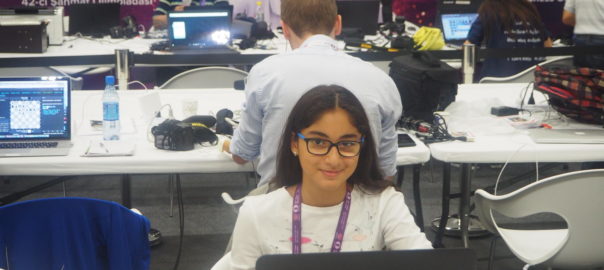
This Olympiad we have been reporting about the many juniors playing and representing their country. But it is not only behind the boards that we see junior players, in the press room we can find 13 year old Aydan Huseynova from Azerbaijan behind a laptop.
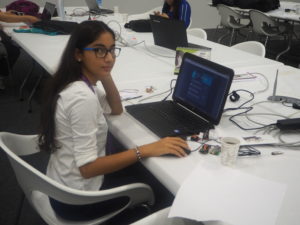
Her father, chess journalist Rasim Huseynov, taught her chess at the very young age of 3 years old! Eventhough she does not play chess at school, she has been fortunate to travel around the world and play chess in tournaments in Montenegro, Turkey and Greece. And with a rating of 1542 she can certainly hold her own behind the board.
Chesslife: We have been seeing you work very hard, what kind of things have you been doing?
Aydan: I have been helping my dad with the cropping and editing of photo’s. They have then been published on the Baku Olympiad website.
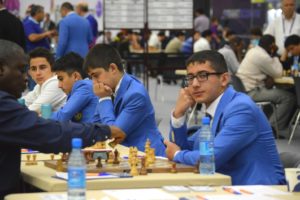
Chesslife: We have been seeing you here, but should you not have gone to school during the week?
Aydan: We are in the middle of our school holidays, so plenty of time for me to help out dad. Next week school returns, I go to a public school here in Baku.
Chesslife: So what makes you want to come out here and work and not stay at home and spend time with your friends?
Aydan: I would like to learn and grow as a person. Sitting at home would just be boring. Here I can meet interesting people.
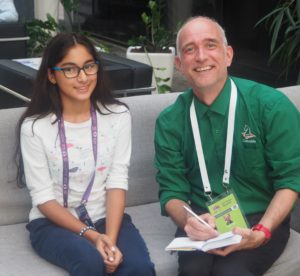
Chesslife: Returning to your own chess. What is your favourite chess book?
Aydan: My favourite book is one of tactics by Leonid Kubbel. He was a Russian composer of chess endgame studies and problems.
Chesslife: Who is your favourite player?
Aydan: That would be the late Vugar Gashimov.
For those that may not be aware – Vugar Gashimov was an Azerbaijani Grandmaster and played in the Olympiads in 2002, 2004, 2006 and 2008. At his peak in 2009, he was the number 6 player in the world. Unfortunately in February 2000 he was diagnosed with epilepsy and doctors found a brain tumour shortly after that. While receiving treatment for the brain tumour, he died in Germany in January 2014. He is buried in Baku at the Alley of Honour, a cemetery for famed Azerbaijani’s.
Chesslife: What is your most memorable game from this Olympiad?
Aydan: The game that is currently in play in the third Azerbaijan team. If Abdulla Gadimbayli wins, the team wins, if he draws the team draws, if he loses, the team loses.
The third Open team from Azerbaijan is nicknamed ‘The Small Tigers’ and with the players aged from 13 to 16, they are showing how strong Azerbaijan will remain for many years to come.
Chesslife: What would you like to do in the future?
Aydan: I would like to become a criminologist, a lawyer specialising in crime. Chess is just a hobby, but I may hopefully one day become a WCM (Womens Candidate Master)
Chesslife: Don’t you want to become a Women’s Grandmaster?
Aydan: That is impossible!
Chesslife: Your level of English is amazing, where did you learn?
Aydan: I have a tutor to teach me English.
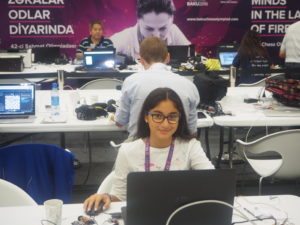
Chesslife: So besides chess, journalism and criminology, do you have any other hobbies?
Aydan: I like to listen to music and play footbal and volleybal.
Chesslife: What advice would you give to Australian Juniors?
Aydan:
Do something you love, not what your parents want you to do!
Great advice Aydan and we love the work you have been doin! You are an inspiration to many young people out there!
The next Aydan and Rasim took us to the grave of late GM Vugar Gashimov. An amazing place that is a worthy resting place for such a chess legend.
We were then taken to the famous Baku Chess Club, where you can feel the decades of chess history
Just a couple of days ago we released our interview with 17 year old Grandmaster Murali Karthikeyan from India.

Since this interview Murali has been generous enough to make some time in his busy schedule to provide us with his most memorable game. And not only did he provide us with the PGN, he also took the time to annotate this for you. David has provided some further additional comments to the game.
This was played against Jason Cao at the World Youth Championships in 2014.
So enjoy a review of Murali and David about the game that provided this young Grandmaster with his title!
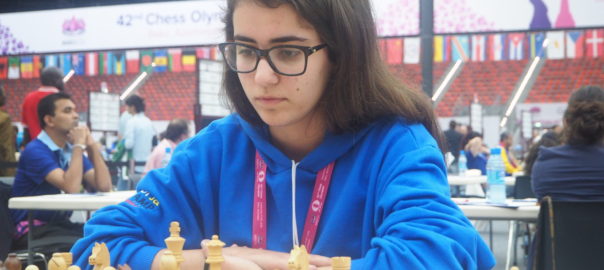
18 year old Kathie Lebrelato with a rating of 2079 is Brazil’s youngest player on the Women’s team. She is currently the top female in Brazil U18 and the 7th ranked female U18 in South America. In this Olympiad she has been selected to play board 4, but has played a couple of games on board 2 and 3.
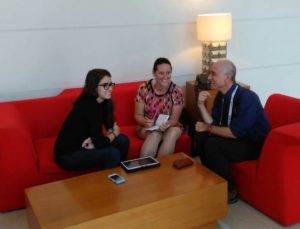
Brazil, the largest country in South America stretches from the Amazon Basin in the north to vineyards and massive Iguaçu Falls in the south. It is the world’s fith largest country. Rio de Janeiro, symbolized by its 38m Christ the Redeemer statue atop Mount Corcovado, is the capital. Unlike some of the other South American countries, the language spoken in Brazil is portugese.
Of course we are all familiar with Brazil, not only for their excellent soccer team, but also for hosting the Olympics and Paralympics this year. Who can forget all our swimmers, cyclists and athletes proudly representing Australia only a couple of weeks ago. Perfect time to ask Kathie about her journey from Brazil.
Chesslife: How old were you when you started playing chess?
Kathie: I started playing chess when I was about 10 years old at school. I started playing seriously with coaching when I was about 13 years of age.
Chesslife: How much chess do you study per week or per day?
Kathie: I study every day, approximately 3-4 hours. I have started studying endgames now as there is so much I don’t know yet.
Chesslife: What is your favourite chess book?
Kathie: I enjoy reading ‘Excelling at Chess’ by Jacob Aargaard [published by Everyman chess in 2002]. I am reading this is in Spanish not English.
Chesslife: Is this your first Olympiad and what was your first International Tournament?
Kathie: Yes this is my first Olympiad. My first international tournament was in 2015 in Colombia, the Sul Americano U20.
Chesslife: Who is your favourite player?
Kathie: I love watching Alexandr Fier, a Brazilian Grandmaster currently playing on board 1, but of course Caruana and Carlsen are also on the top of my list! I love their dynamic playing style.
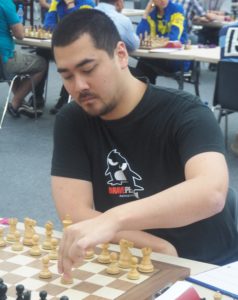
Chesslife: What is the junior chess league llike in Brazil?
Kathie: There are quite a few juniors playing, but not many progress. I think this is because there appears to be no incentive for them to continue playing. My city Icara has many tournaments and is supportive of chess, so I have been very lucky.
Chesslife: What has chess taught you?
Kathie: Chess has taught me many things. It has allowed me to play in many cities around Brazil and the world. I am a very shy person and chess has taught me to talk and interact with different people. Something I would have never done without chess. I am more social now. Lastly I have matured a lot through chess. I am taking responsibilities for decisions in life.
Chesslife: How would you describe your style of play?
Kathie: I am trying to become more dynamic, but I am a very positional and quiet player, which matches my personality. I enjoy playing solid games. At the moment I play very dynamic for Black, but am looking at changing that to a slower Kings Indian variant.
Chesslife: What is your most memorable game?
Kathie: I truly enjoyed the game I played against Wales in the Olympiad in round 6. I was a very positional game, well balanced.
Chesslife: What are your goals for the future?
Kathie: To continue to improve my chess and play at the next Olympiad for Brazil. This means I will need to play in many tournaments in the next couple of years, for example the Brazil Open. For the slightky longer term, I would like to become a WGM.
Let’s give you a bit of an overview of the difference between GM (Grandmaster) and WGM (Women’s Grandmaster):
The title Grandmaster is awarded to outstanding chess players by FIDE. Grandmaster is the highest title a chess player can attain. Woman Grandmaster (achieved at some time a rating of 2300) is the highest-ranking chess title restricted to women aside from Women’s World Champion. FIDE introduced the WGM title in 1976. The WGM title represents a level of chess skill lower than that of the unrestricted Grandmaster (GM) (2500) title, and WGM requirements are also a little bit lower than the requirements for the unrestricted International Master (IM) (2400) title. The winner of the World Girls Junior Championship is automatically awarded the WGM title. (information obtained from Wikipedia)
Chesslife: What advice would you give to Australian Junior chess players?
Kathie:
Do what you like! If you like chess, play chess!
You should never fear major challenges. You should always seek to play against the best and not fear this as it will evolve your chess and you will become a better player.
Play chess with Joy!
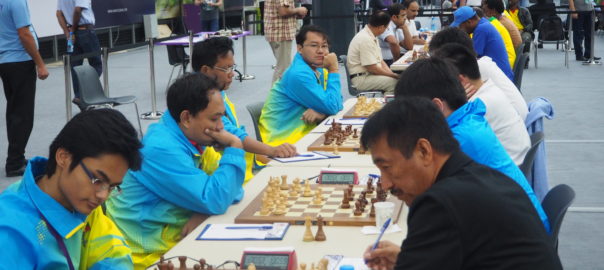
Myanmar – or Burma as some people know it – is a country that has been in the news for many years and to see the Open team so proudly behind their boards is exciting.
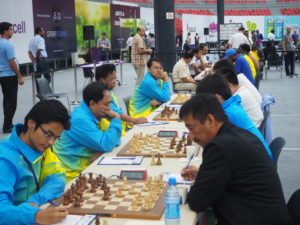
Myanmar, formerly known as Burma is a Southeast Asian nation of more than 100 ethnic groups, bordering India, Bangladesh, China, Laos and Thailand. Yangon, formerly known as Rangoon is the country’s largest city, while Naypyidaw is the country’s capital.
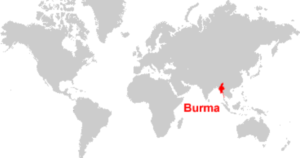
The first thing Maung Maung tells us proudly is that his sister is currently stuyding accounting in Melbourne, so being interviewed by Australia only seems fitting. Currently ranked the top player U16 in Myanmar with a rating with 2031, he plays on board 4. His english is excellent, but our trusty google translate is showing that burmese is a beautiful language, so our first question is as follows:
Chesslife: How old were you when you started playing chess?
သငျသညျ စစ်တုရင် ကစားခြင်း ကိုစတင် တဲ့အခါသင် ဘယ်လို ဟောင်း ခဲ့ကြ
Maung Maung: I started when I was 7 years old and was taugt by my dad. I then played at school and progressed from there.
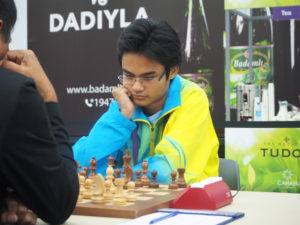
Chesslife: How many hours per week do you study?
Maung Maung: I study between 2-3 hours per day. Mainly middle games, combinations and strategies. The magazine ‘New in Chess’ is my favourite source.
Chesslife: What is your favourite chess book?
Maung Maung: ‘Openings for White according to Kramnik’. Although I also love using the ‘Encyclopedia of Chess Combinations’ David agrees – yes I call that the ‘Chess Bible’, definitely a good one!
Chesslife: Is this your first Olympiad and what was your first International Tournament?
Maung Maung: Yes this is my first Olympiad and my first international tournament was in 2013 in China, the China vs Asean Junior Chess Classic.
Chesslife: Who is your favourite player?
Maung Maung: That would be Sergey Karajakin. I like his playing style and think he will be the next World Champion!
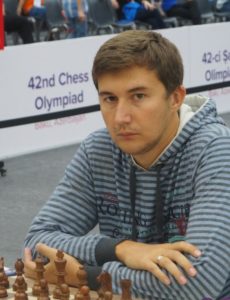
Chesslife: What is the junior chess league like in Myanmar?
Maung Maung: Chess is not very popular in Myanmar. People consider it boring, but it is getting abit better now that the government is involved and is introducing chess in schools.
Chesslife: What has chess taught you?
Maung Maung: It has taught me to analyse situations in life before making a decision. It has also given me friends around the world.
Chesslife: How would you describe your style of play?
Maung Maung: If I need to win I can play very aggressively, but normally I play very positional and slow. With white I play Nf3, while with Black I play the Caro-Kann or the Slav.
Chesslife: What is your most memorable game?
Maung Maung: That would have to be the game against Andorra! I loved that one!
Chesslife: What are your goals for the future?
Maung Maung: I hope to obtain an FM title in this tournament. To do that I need 7/10, so as I have 2.5/4 at the moment, I might still have a good chance! Of course a big goal is to become a Grandmaster and hopefully a career in chess.
Chesslife: What advice would you give the Australian Junior Chess players?
Maung Maung: You need to try your best and find a balance between school and chess. Hopefully I will meet some of the Australian Junior players at the World Youth Chess Championships next year!